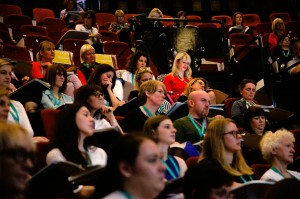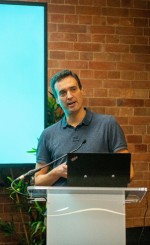SPPC Annual Conference
SAVE THE DATE:
SPPC Annual Conference 2026: Wednesday 28 October, John McIntyre Conference Centre, Edinburgh. More details to follow.
Details of last year’s annual conference are below.
From System Holes to Whole Systems
John McIntyre Conference Centre, Edinburgh
12 November 2025
Exploring a whole system approach
 As someone approaches the end of life they may need a range of supports – from health services, from social care services, from the welfare system, and from family, friends and their communities. The SPPC Annual Conference 2025 explored how this complex web of supports can work more effectively as a system to improve people’s experiences of living with serious illness, dying and bereavement.
As someone approaches the end of life they may need a range of supports – from health services, from social care services, from the welfare system, and from family, friends and their communities. The SPPC Annual Conference 2025 explored how this complex web of supports can work more effectively as a system to improve people’s experiences of living with serious illness, dying and bereavement.
View the Conference Programme here: Conference Programme
View the Poster Exhibition here: Poster Exhibition 2025
Plenary Sessions
 Whole System Approaches to Palliative Care
Whole System Approaches to Palliative Care
Toby Lowe, Professor of Public Management at Manchester Metropolitan University and Visiting Professor at Centre for Public Impact
Toby’s opening session provided a framework for thinking about “a whole system approach” for the rest of the day.
What do people mean by “the system”? What is the connection between the system and meaningful outcomes in people’s lives? How could things be managed and organised differently to achieve the improvements we want to see?
Toby drew on practical examples and provided opportunities for interaction. View Toby’s presentation here.
 People and Family Experiences
People and Family Experiences
Jo Bowden, Consultant in Palliative Medicine & University of St Andrews Clinical Research Fellow
Stephen Fenning, Consultant in Palliative Medicine
Shona Simon, Palliative Care Researcher
30,000 people are diagnosed with cancer each year in Scotland. A third of these people live less than a year, and their pathways, experiences and outcomes are largely unknown to “the system”.
 In this session Jo, Stephen and colleagues shared the latest learning from the major i-Qual-PPC research study which is tackling this invisibility. What do people and their families experience? What do they really value about the system and what needs to change? How might this study inform improvement for people with other conditions? View Jo, Stephen & Shona’s presentation here.
In this session Jo, Stephen and colleagues shared the latest learning from the major i-Qual-PPC research study which is tackling this invisibility. What do people and their families experience? What do they really value about the system and what needs to change? How might this study inform improvement for people with other conditions? View Jo, Stephen & Shona’s presentation here.
The Trees of Hallaig: roots of care, leaves of memory
Donald Macaskill, Chief Executive, Scottish Care
 Each day in Scotland tens of thousands of people depend on staff in care homes, care at home and housing support to enable them to live as well as possible until they die.
Each day in Scotland tens of thousands of people depend on staff in care homes, care at home and housing support to enable them to live as well as possible until they die.
In this session Donald explored the often unseen and undervalued role of social care staff in providing physical, practical, social, emotional and spiritual support to both individuals and their family members.
What can other parts of the system learn from social care?
Listen to Donald’s presentation as a podcast here: The Trees of Hallaig: roots of care, leaves of memory
View Donald’s presentation slides here.
Community First
Cormac Russel, Managing Director, Nurture Development Watch a video of Cormac’s presentation below.

Parallel Sessions
Session A: A system for everyone: psychological care and a trauma-informed approach
 Clare McGowan, Consultant Clinical Psychologist. Beatson West of Scotland Cancer Centre and the National Haematopoetic Stem Cell Transplant Service
Clare McGowan, Consultant Clinical Psychologist. Beatson West of Scotland Cancer Centre and the National Haematopoetic Stem Cell Transplant Service
In this session Clare reflected on the psychological care and support which people often need, and the roles played by different health and social care professionals in addressing different levels of complexity. She considered how a trauma-informed approach can help to ensure that the system serves people who may find it difficult to engage with services. View Clare’s presentation here.
Session B: Palliating Uncertainty: Tools from the Philosophy of Pragmatism
 Ariel Dempsey, Physician and postdoctoral fellow in the University of Oxford Faculty of Theology and Religion
Ariel Dempsey, Physician and postdoctoral fellow in the University of Oxford Faculty of Theology and Religion
“Medicine is a science of uncertainty…”
~William Osler, Father of Modern Medicine
Uncertainty is inherent to the practice of palliative care. This session explored insights from the philosophy of pragmatism and discovered practical tools to help you, your colleagues, and your patients not just manage uncertainty, but act in the midst of it and live with it well. View Ariel’s presentation here.
 Session C: Introducing the potential of AI within Public Health and Healthcare Systems in Scotland
Session C: Introducing the potential of AI within Public Health and Healthcare Systems in Scotland
Chris Harkins, Public Health Programme Manager, Glasgow Centre for Population Health
Artificial Intelligence is all around us. It is changing the world in ways which are scary and ways which are full of potential for good. In this session Chris provided an introduction to the role of AI in Scotland’s public health and healthcare. He considered AI’s capacity to supplement clinical practice and decision-making, analyse vast amounts of complex population health data at near instantaneous speed, improve healthcare systems efficiency, and personalise patient care. He will also consider how ethical frameworks, good governance, careful evaluation and understanding how the public feels about AI in healthcare, can mitigate some of the risks which this technological revolution brings. View Chris’ presentation here.
Session D: Bereavement
This session featured short presentations highlighting four different and innovative pieces of work which aim to understand and improve people’s experiences of bereavement:
- My Grief My Way, an online bereavement support intervention underpinned by Acceptance and Commitment Training (ACT). Presented by Anne Canny, University of Edinburgh. View Anne’s presentation here.
- Dove Cafes, a compassionate initiative designed to offer information, emotional support, and connection for those navigating grief and loss. Presented by Sine MacDonald, Kilbryde Hospice. View Sine’s presentation here.
- Evaluating the impact of the Bereavement Charter Mark for Workplaces. Presented by Rebecca Patterson, Scottish Partnership for Palliative Care. View Rebecca’s presentation here.
- Impact of Parental Bereavement on Children and Families during Covid-19 in Scotland. Presented by Bright Antony, University of Strathclyde.
View the Conference Programme here: Conference Programme
Poster Exhibition & Derek Doyle Poster Prize
The Poster Exhibition shared work from across Scotland and beyond, with 36 people displaying posters at the conference. You can vies the posters online here: Poster Exhibition
Congratulations to Julie Wilson and Jilly Dryburgh, winners of the Derek Doyle Poster Prize 2025, as voted for by SPPC Annual Conference delegates. You can view their winning poster here:
Poster photo credit: Yonghyun Lee
Photo of Cormac Russel: Georg Lulich